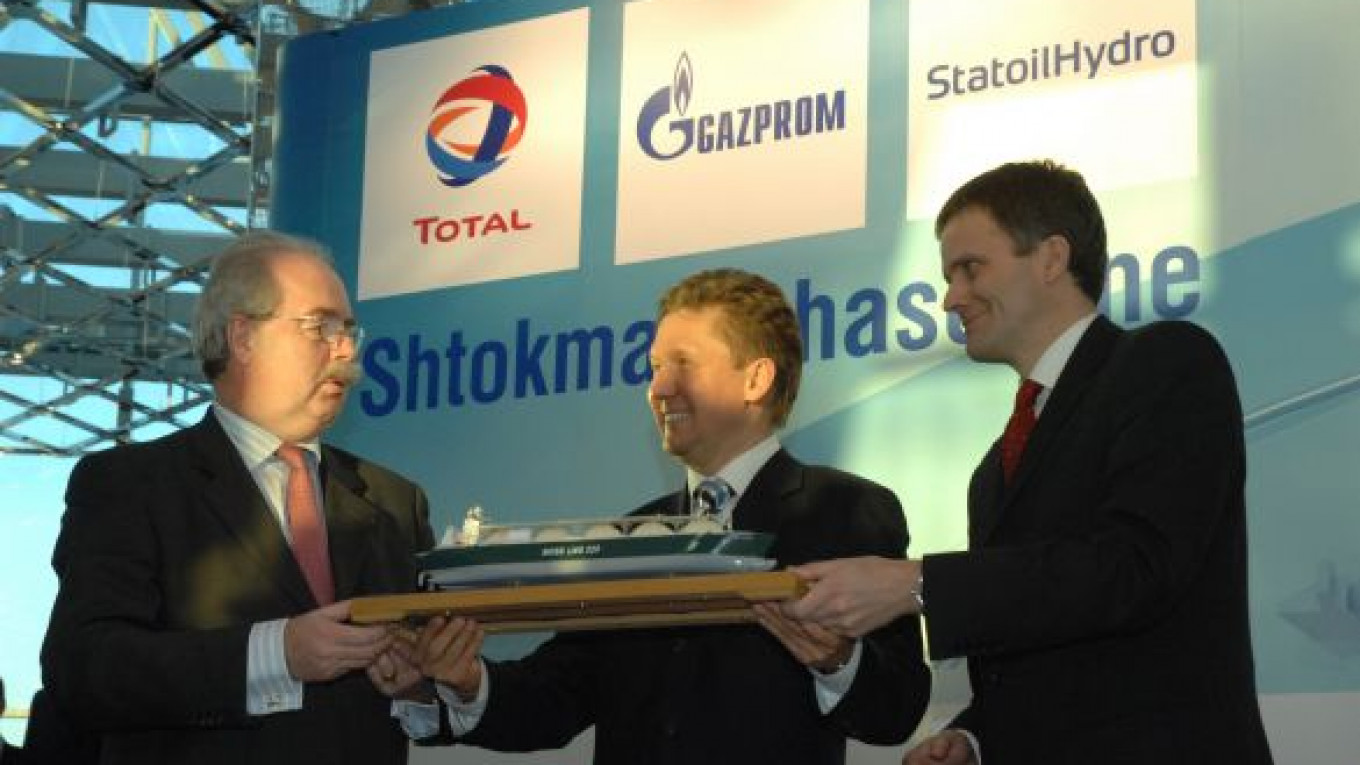PARIS — New contractual terms for the development of Shtokman, Russia's giant Arctic offshore gas field, are to be agreed by the end of June, with a final investment decision put off until next year, the head of project partner Total said.
"We want to sign new contractual terms before the end of June," chief executive Christophe de Margerie said in an interview, adding that he expected the French firm to retain its status as lead foreign investor in the already long-delayed project, despite Moscow having ordered a radical redesign.
The emergence of a viable project to develop Shtokman's 3.9 trillion cubic meters of gas below the Barents Sea — more than the entire reserves of gas-rich neighbor Norway — would end nearly two decades of false starts with two successive groups of investors.
The current consortium, which is led by Gazprom and also includes Norway's Statoil, is now expected to drop plans to pipe half of Shtokman's gas to Europe in favor of a liquefied natural gas plant that could ship super-cooled gas to a wider range of markets.
However, plans for a redesign have called into question the distribution of investor roles in the consortium, Moscow industry sources said. Total, with more equity in the project than Statoil, led much of the design work on the current development scheme for Shtokman.
Industry sources in Moscow say all existing tenders have been canceled and the corporate structure, Shtokman Development, downsized, potentially leaving room for a fresh start on determining how the project is run.
But de Margerie said he did not expect Total's role to shrink to that of a junior partner below Statoil.
"I don't know why this conspiracy exists," he said. "I have not heard of a coup d'etat," he said. "It's a very tricky project, capital intensive and complex. There is no need and time for internal fights between partners."
"If there's one partner among the three that is a specialist in LNG it is probably Total," de Margerie said.
Gazprom holds a 51 percent stake in the project currently, with Total having 25 percent and Statoil 24 percent.
De Margerie said costs for Shtokman could fall as an LNG project compared with its previous plan for exporting half of the output through a new pipeline and half on LNG tankers.
"What we might lose with delaying the final investment decision could be totally or partially recovered during the construction period for the onshore part," he said.
Last month, Statoil's chief executive Helge Lund said he hoped cutting out the pipeline element of the project could bring down the overall capital cost.
De Margerie also defended Total's performance at its Russian Kharyaga field in northern Russia and said he did not expect it to cause trouble for Total with the Russian government.
"I don't see that Kharyaga would really become a source of conflict," he said.
Total earlier this year slashed the oil production outlook at Kharyaga, citing a revision of reserves.
It had previously seen annual peak production of 3.2 million tons in 2013. But Total's chief geologist in Russia, Renaud Gauchet, said the new peak production level of 1.9 million to 2.0 million tons of crude is expected in 2017-2018.
"The problem, if there is a problem, is that everyone would like to see production higher," de Margerie said.
He noted that oil prices have risen sharply from the $20 a barrel that prevailed when Kharyaga came onstream.
"Of course, they would prefer to have more at $100 a barrel, but at the same time we have to produce this on a safe basis," he said.
Turning to other production problems, de Margerie said the gas leak at Total's Elgin field in Britain's North Sea, which began at the end of March, would cost the group a little more than $300 million in lost production in a worst-case scenario, were gas and condensate production not to restart before the end of this year.
De Margerie also said Total expects to reach a deal by the end of the year with China, the world's second-largest oil importer, on taking a stake in the country's Zhanjiang refinery and petrochemicals complex.
Total has already signed a deal with state-run Kuwait Petroleum Corporation to take part in the development of the 300,000 barrels per day refinery in partnership with Chinese refiner Sinopec.
A Message from The Moscow Times:
Dear readers,
We are facing unprecedented challenges. Russia's Prosecutor General's Office has designated The Moscow Times as an "undesirable" organization, criminalizing our work and putting our staff at risk of prosecution. This follows our earlier unjust labeling as a "foreign agent."
These actions are direct attempts to silence independent journalism in Russia. The authorities claim our work "discredits the decisions of the Russian leadership." We see things differently: we strive to provide accurate, unbiased reporting on Russia.
We, the journalists of The Moscow Times, refuse to be silenced. But to continue our work, we need your help.
Your support, no matter how small, makes a world of difference. If you can, please support us monthly starting from just $2. It's quick to set up, and every contribution makes a significant impact.
By supporting The Moscow Times, you're defending open, independent journalism in the face of repression. Thank you for standing with us.
Remind me later.






